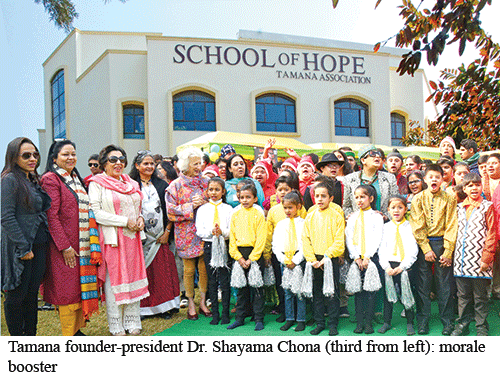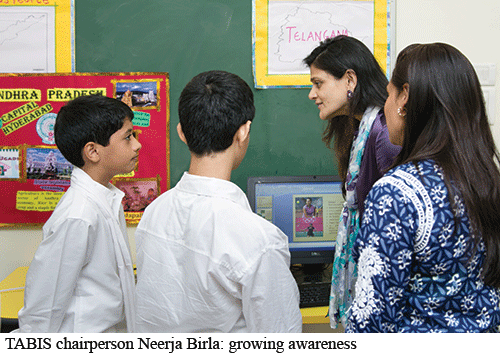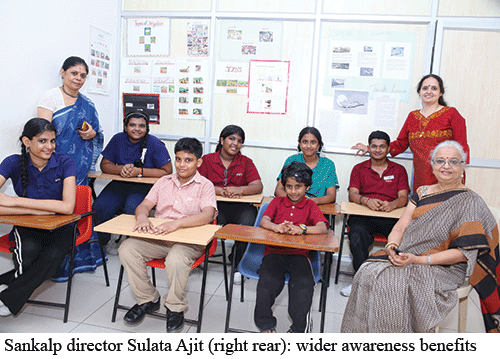The objective of the EW league table ranking the country’s most respected special needs schools is to enable parents to make informed choices, as also to acknowledge the country’s pioneer institutions in this important category
 Although your editors introduced the parameter of special needs education in the annual EW India School Rankings to encourage mainstream schools to provide for children with special needs (CWSN) way back in 2011, in response to parental pressure, last year we introduced a separate league table ranking the country’s most admired special needs schools.
Although your editors introduced the parameter of special needs education in the annual EW India School Rankings to encourage mainstream schools to provide for children with special needs (CWSN) way back in 2011, in response to parental pressure, last year we introduced a separate league table ranking the country’s most admired special needs schools.
Even though an estimated 2 percent of India’s 480 million children aged below 18 years suffer from physical disabilities, mental retardation and learning disabilities, a minuscule 0.89 percent (12,868) of India’s 1.4 million primary-secondaries provide education to CWSN, according to Elementary Education in India 2014-15, published by the Delhi-based National University of Educational Planning and Administration (NUEPA). Against this depressing backdrop, the objective of the EW league table ranking the country’s most respected special needs schools is to enable parents to make informed choices as also to acknowledge the nation’s pioneer special needs schools.
To compile the second EW Special Needs Schools Rankings 2016, C fore field researchers interviewed 253 knowledgeable respondents including parents and special educators in four cities. The schools were rated on ten parameters: teacher welfare and development, competence of faculty, quality of programme, rehabilitation, co-curricular education, individual attention to students, leadership/management quality, safety and hygiene, infrastructure provision and value for money.
The #1 slot in the EW Special Needs Schools Rankings 2016 is retained by the Tamana Autism Centre — School of Hope, Delhi (estb.1992), which has an enrolment of 571 children, and is awarded top ratings on five parameters (teacher welfare and development; competence of faculty; quality of programme; leadership/management quality; infrastructure provision). The second and third rankings are awarded to New Delhi-based Amar Jyoti (estb.1981) and Asha Kiran Special Needs School, Bangalore (estb.1993) for the second consecutive year.
 Comments Dr. Shayama Chona, former principal of Delhi Public School, R.K. Puram (Delhi) where she served for 35 years (1978-2009), and founder-president of Tamana: “A national league table recognising the dedicated work being done by the country’s best special needs schools will serve as an inspiration to individuals and organisations aspiring to promote similar institutions. For Tamana’s teachers, students and parents, the #1 ranking is a morale booster. It motivates us to continue our mission of providing the most enabling environment for special needs children. Our excellent reputation has been built by our team of highly qualified educators who use latest pedagogies and technology to harness the full potential of students with disabilities. Students from SAARC countries and even from the US are with us in Tamana, while several special educators from Asian countries come here for training,” says Chona.
Comments Dr. Shayama Chona, former principal of Delhi Public School, R.K. Puram (Delhi) where she served for 35 years (1978-2009), and founder-president of Tamana: “A national league table recognising the dedicated work being done by the country’s best special needs schools will serve as an inspiration to individuals and organisations aspiring to promote similar institutions. For Tamana’s teachers, students and parents, the #1 ranking is a morale booster. It motivates us to continue our mission of providing the most enabling environment for special needs children. Our excellent reputation has been built by our team of highly qualified educators who use latest pedagogies and technology to harness the full potential of students with disabilities. Students from SAARC countries and even from the US are with us in Tamana, while several special educators from Asian countries come here for training,” says Chona.
The Top 5 table in this category is completed by the recently promoted The Aditya Birla Integrated School (TABIS), Mumbai, ranked #4 nationally (6 in 2015) and the S.P.J. Sadhana School, Mumbai #5 (4).
“Our improved ranking this year reaffirms that we are moving in the right direction. We are determined to improve with each passing year to deliver the latest pedagogies and development programmes to our special children. Our highly-qualified team of special educators, psychologists and therapists have quickly learnt to deliver individualised programmes based on every child’s skill sets and learning abilities. We have also introduced our Practice School, an internship programme for special needs children to acquire practical experience and prepare for employment. There is growing awareness within the public of the potential of children with special needs and I am thankful for it,” says Neerja Birla, chairperson of the Aditya Birla Education Trust.
Promoted by the Aditya Birla Education trust which has also established the Aditya Birla World Academy (#5 international day school), the National Institute of Open Schooling-affiliated TABIS provides education and therapy programmes to 168 children with learning disabilities (dyslexia, dysgraphia, dyscalculia and attention deficit hyperactivity disorder).
Further down the 16-strong national league table of India’s most respected special needs schools, there’s been minor rearrangement of seats. The Sparsh Special School, Delhi has debuted in the Top 10 league table at #6 and is followed by the Academy for Severe Handicaps and Autism, Bangalore at #7 (5 in 2015). The Gateway School, Mumbai is ranked #8 (7), Bethany Society’s Jyoti Sroat, Shillong #9 (8), and Sankalp, Chennai #10 (9).
 Sulata Ajit, a postgraduate in special and inclusive education of Northampton University, UK, and co-founder and director of Sankalp, Chennai (estb. 1992), which offers education and vocational training to 250 students, is encouraged by the school’s Top 10 national, and especially the Chennai #1 ranking. “For a day school the city ranking is of greater importance and I am glad that the survey respondents have acknowledged our efforts to provide rehabilitative education to special children. Wider awareness of our capability will help our recently launched programme to set up small-scale community-based enterprises for autistic children. It will also help us to enroll some of our children in mainstream schools and conduct teacher training programmes in other schools,” says Ajit.
Sulata Ajit, a postgraduate in special and inclusive education of Northampton University, UK, and co-founder and director of Sankalp, Chennai (estb. 1992), which offers education and vocational training to 250 students, is encouraged by the school’s Top 10 national, and especially the Chennai #1 ranking. “For a day school the city ranking is of greater importance and I am glad that the survey respondents have acknowledged our efforts to provide rehabilitative education to special children. Wider awareness of our capability will help our recently launched programme to set up small-scale community-based enterprises for autistic children. It will also help us to enroll some of our children in mainstream schools and conduct teacher training programmes in other schools,” says Ajit.
Sujata Choudhury
To view EW India Special Needs Schools Rankings visit http://www.educationworld.in/rank-school/all-cities/special-needs-school/2016.html